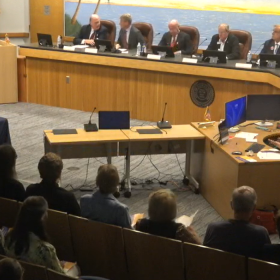
Gulf Coast Life
Monday through Thursday at 1 & 9PM
Hosted by Mike Kiniry
Gulf Coast Life is a locally produced talk show that strives to connect listeners to the people, places, and things that make Southwest Florida unique.
Produced & Hosted by: Mike Kiniry
Contributing Hosts: John Davis, Cary Barbor, and Tara Calligan
Facebook: WGCU Public Media
Twitter: twitter.com/wgcu - #GCL
Latest Episodes
-
Dr. Raymond DePaulo began as a student at the Johns Hopkins University School of Medicine in 1968 and went on to become an M.D. in 1972 and then did his residencies there. He founded the Affective Disorder Clinic in 1977 and these days he’s co-director of the Johns Hopkins Mood Disorders Center. He was on the Florida Gulf Coast University campus to give a talk for the university’s Provost’s Seminar Series so stopped by the studio for a conversation about his work and career and the changes he’s seen over the past 58 years. He also spoke with the Naples Discussion Group while he was in town.
-
Amyotrophic lateral sclerosis (ALS) is a rare, progressive, and fatal neuromuscular disease for which there is currently no known cure. It typically manifests in mid-to-late adulthood and progresses rapidly with a median survival time of two to five years, though it can sometimes progress faster. It's currently diagnosed through a long process that can often take well over a year. We learn about a new technique developed at the nonprofit Brain Chemistry Labs in Jackson, Wyoming that can diagnose ALS with a simple blood test with 97% accuracy.
-
We hear from the Florida Health Professionals for Scientific Integrity. It is a group of healthcare workers who are concerned about trends in public health in Florida, particularly the end of vaccine mandates in schools.
-
The Center for Inquiry was founded in 1976 by the likes of Carl Sagan and Isaac Asimov to investigate what they called ‘extraordinary claims’ being made about things like paranormal activity and UFO abductions — things that fall into the category of pseudoscience. We talk with the center's Director of Education, Bertha Vazquez, about the work she does and the role of science in our lives, and the crucial need for a skeptical mind in the face of information overload.
-
Long form journalism and deep dive investigative reporting on local issues have historically been the domain of local newspapers. But as newsrooms have shrunk, gaps have been created — and a new model for local journalism has emerged in response: nonprofit newsrooms, mostly comprised of reporters who once worked for newspapers and other forms of commercial media. We meet the Executive Editor-in Chief of Suncoast Searchlight which focuses on Sarasota, Manatee, and DeSoto Counties to get a sense of their origin story and mission — and reflect on the state of local news that’s led to the rise of these online, nonprofit news organizations.
-
Ahead of the Feb. 3, 2026, Naples City Council election, the League of Women Voters of Collier Council organized a candidate forum for all eight candidates seeking three open seats on the council. We’ll hear a condensed broadcast of the forum moderated by Naples Daily News Executive Editor Wendy Fullerton Powell and WGCU’s John Davis.
-
New David Lawrence Centers program, Pathways to Healing, helps people undergoing behavioral health treatments with transition after hospitalization.
-
As Jan. 13th marks the start of Florida’s 2026 legislative session, we’re exploring bills and issues likely to take center stage over the course of the 60-day session in a conversation with Florida Gulf Coast University Political Science professors Roger Green, Ph.D., Sandra Pavelka, Ph.D, and University of Central Florida Political Science professor Aubrey Jewett, Ph.D.
-
Despite record high stock markets, the Harry Chapin Food Bank of SWFL and its partners are busier than ever because of factors like high food, housing, and health insurance costs — along with cuts to federal programs that help people in need including $186 billion in cuts to the Supplemental Nutrition Assistance Program (SNAP) in the so-called Big Beautiful Bill. The Harry Chapin Food Bank distributed 38.7 million pounds of food last year. And to keep up with the growing need, they have begun construction of a new 110-thousand-square-foot distribution center and warehouse being built in Fort Myers that will be their new Hunger Action Center. We sit down with the food bank's president and CEO to get a sense of what they’re experiencing right now, and what the new facility will mean for their operations. We also meet the director of one of their partner agencies.
-
It’s well-known by now that invasive Burmese pythons have become established in the Florida Everglades. And you may have heard of the state’s annual Python Challenge, when hunters compete to remove as many Burmese pythons from the Everglades as possible with prizes going to whoever is most successful. But you may not be aware of the South Florida Water Management District’s Python Elimination Program, which has been around since 2017. Earlier in January, the head of the district’s Python Program kicked off the Clinic for the Rehabilitation of Wildlife's 2026 speaker series with a talk all about the program and the impact these large snakes have. We get a preview.










